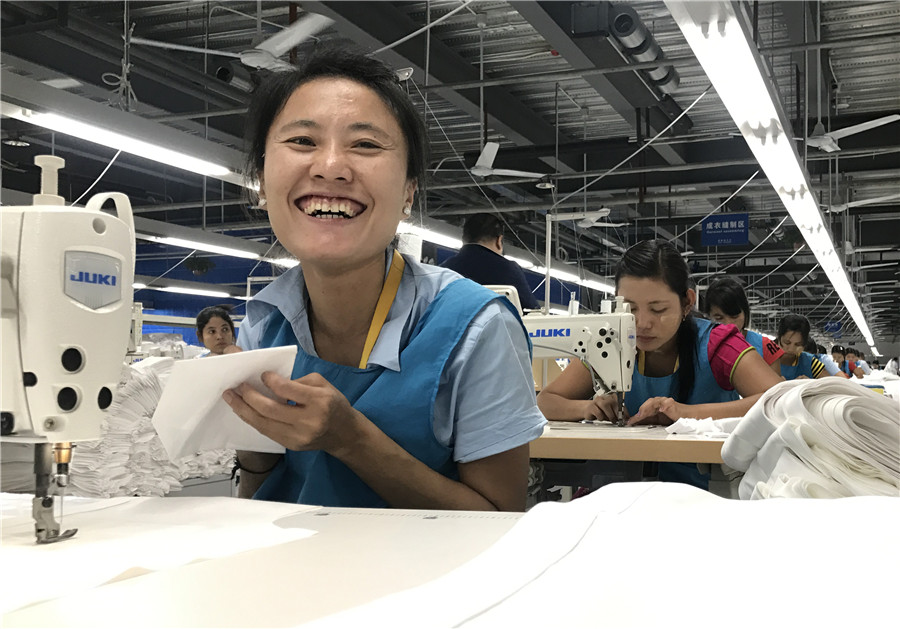Ruili's pioneering policies make for good neighbors


Nearly six years after the border city of Ruili took the initiative to allow foreigners to work and live there without needing a passport, the small city in Yunnan province, facing Myanmar, is planning to take another step in that direction.
The city plans to make changes in its employment procedures for foreigners to improve efficiency with the introduction of a "smarter" work permit, the local government said.
The permit is a card called the bao bo in Chinese, the name transliterated from the word for brotherhood in Burmese. The new system will merge three permits required of foreigners-a resident card, a health card and a work card-into one.
The new card would have all the holder's information digitized on a chip connected to their cell phone, making it possible for them to complete the application or update information on a mobile device with internet access.
The first of the new cards, also the first of its kind in China, is expected to be issued by June.
"It is unprecedented as we have broken the international protocol of using passports. We are forced by reality to think outside the box," said Shao Yongbao, director of Ruili's Foreigners' Service and Administration Center, which issues the cards.
Known as the Shenzhen of the southwest region after the manufacturing hub in Guangdong province, Ruili was one of the first cities to open up to neighboring countries, including Myanmar, in the 1990s. With China's economy becoming a global powerhouse, the city has seen a growing number of job hunters from Myanmar.
Almost one-third of the city's nearly 200,000 residents come from Myanmar. Many of them don't have a passport because of the difficulties of obtaining one in their home country, Shao said.
In 2013, the center was created in an innovative move by combining officials from the local police, customs, social security and health departments. Foreign applicants were allowed to go through the process at one place, using one form with just their national identity cards.
"The purpose is to help more people obtain a legal work permit while not intimidating them with a lot of red tape," Shao said.
The center's officials said they had given out more than 110,000 work permits, valid for one year, as of the end of 2018. Holders of the permit can be employed only within Ruili.
U Sein Win Aung, chairman of China-Myanmar Friendship Association, praised the system during a recent visit to Ruili as a way to "guarantee foreigners' legal rights" and "a boost of confidence to pursue a better life" in China.
It has also been widely adopted by a dozen border cities in China.
To help foreigners better adapt to life in the country, a school called the China-ASEAN Education and Training Center was established in 2014. Backed by the Ministry of Foreign Affairs, the school offers free lessons including Chinese language, laws, regulations and disease prevention. ASEAN is the Association of Southeast Asian Nations.
About 18,000 people have taken classes at the part-time school, which provides tips as basic as the meaning of the three colors on traffic lights.
While the effect of the training is hard to evaluate, Luo Hailin, the center's director and a professor at Yunnan Minzu University, said it is very worthwhile.
"The friendship and respect passed on to Myanmar is invaluable." Luo said. "It's tangible evidence of more than 60 years of friendship between the two nations."
Zhang Mingjie, general manager of the Ruili factory of Youngor, one of China's best-known men's apparel brands, said its effectiveness can be seen in the factory's turnover rate.
He said the factory, which now employs 500 or so workers from Myanmar, used to have farewell parties every month. The company has seen few resignations this year, after it started to work with the center.
"It helps them to better connect with local residents, adapt to life and feel like they have a home away from home here," Zhang said.
"It has already become my second home," said Ma Chu, 28, a Myanmar worker at Youngor who has been living and working in Ruili for four years.
She is the highest-paid seamstress at Youngor's factory, with a monthly salary of 1,740 yuan ($259).
- Grassroots efforts drive mangrove conservation in Hainan
- US' 'freedom of navigation' based on self-interests, report says
- Water nourishes Xinjiang: Survival code of oasis civilizations
- Researchers develop hybrid downscaling model for high-resolution daily rainfall estimation
- First ultra-zero carbon facility debuts
- China's use of digital, AI tools praised by intl body




































